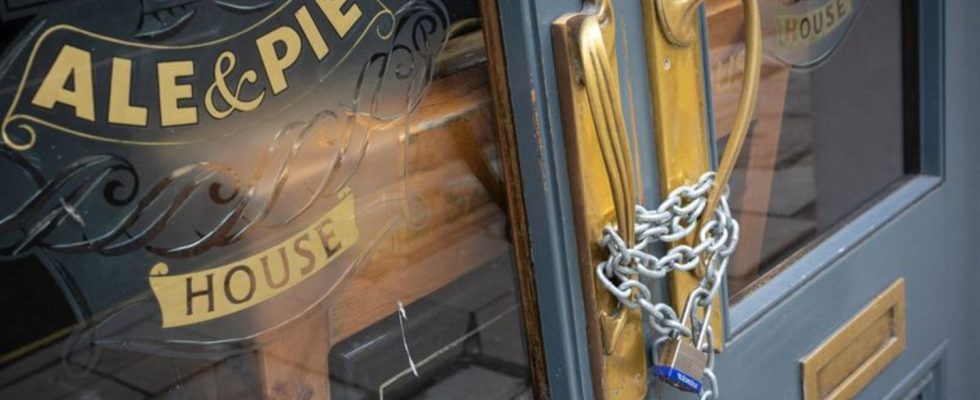London is a tourist mecca, capital, glittering metropolis. But the impression is deceptive. Grab a drink somewhere at 10 p.m.? Hardly possible.
“Swinging London”: When you think of the pulsating metropolis on the Thames, you often think of colorful lights and hustle and bustle until the morning. Soho and Covent Garden are considered dream places for many tourists looking for parties, as night hotspots.
But the reality is different: When visitors stream out of one of the many theaters in the evening and are looking for a midnight snack, those who come from a reception and are still hoping for a nightcap are often disappointed. An open pub in the City of London? Hard to find the time.
“When was the last time you had a real night out in London?” the capital’s newspaper “Evening Standard” desperately asked its readers a few weeks ago, and the “Daily Mail” already sees “the destruction of the London party scene” coming.
British media regularly quote astonished tourists who were thrown out of the pub at 10 p.m. in the glittering metropolis of London and could no longer find an open restaurant. “London’s nightlife in crisis” is how the neoliberal think tank Adam Smith Institute (ASI) recently titled a report on the industry.
Operating costs explode
There are many reasons. Operating costs, especially for wages, energy and raw materials, have skyrocketed by 30 to 40 percent, and fewer customers are coming. As real estate analysts Placemake.io and Visitor Insights determined, in 2022, after the Corona restrictions were lifted, customer frequency in the city fell by 55 percent compared to the pre-pandemic year of 2019.
The Night Time Industries Association (NTIA) estimates that more than 3,000 establishments such as bars and clubs in the British capital have closed since March 2020. The fact that London’s “Night Czar” Amy Lamé, something like the official nightlife commissioner, regularly praises the city as a pioneer of the 24-hour economy that never sleeps has left liberals and conservatives alike shaking their heads.
Nationwide, the numbers are also sobering. While 20 years ago there were more than 3,000 discos in the United Kingdom, there are now only around 850, as the “Times” reported, citing the consulting firm CGA.
The situation is almost even worse for live music venues: last year, 125 of them closed, roughly one in six locations, according to the organization The Music Venue Trust. The Rekom Group, which describes itself as the largest nightlife company in Northern Europe, has already closed branches of its disco chain Przym in Birmingham, Leeds, Nottingham, Portsmouth, Plymouth and Watford this year.
The home office turns employees into “TWaTs”
But hardly any city is as badly affected as London. There are now 16 percent fewer venues in the capital, while in Liverpool the decline was 3 percent. One reason: the increase in home office users, as Graeme Smith from the consulting firm AlixPartners told the Times.
Many people with office jobs only go into the city on Tuesdays, Wednesdays and Thursdays. The pubs in the Westminster government district are packed on Thursdays. But companies have significantly less time to make money. The phenomenon even has its own name: “TWaTs” – Tuesdays, Wednesdays and Thursdays. Typical British humor, many say, because “twat” is actually a swear word. It means something like complete idiot, only more vulgar.
If you then have to pay more than 7 pounds (around 8.15 euros) for a pint of beer (0.568 liters), as in most areas of London, many people consider ordering a second glass and staying longer. An inadequate night timetable is also repeatedly criticized. Added to this are high real estate prices – and therefore high rents, which increase the pressure on pub and club owners, especially if customers don’t show up, as AlixPartners expert Smith explains. With Brexit, there is also a lack of skilled workers in the catering industry: until the EU exit, many young people from Italy, Spain or Portugal worked behind the counter. Now they are missing and the stay is no longer worth it because of expensive visas.
Seven pounds for a pint of beer
The rising cost of living, the “cost of living crisis”, has large parts of society under control, even if the rise in consumer prices has recently declined. Students, an important group for nightlife, would go out later and drink less, Rekom boss Peter Marks told the BBC. This is proven by studies by the National Union of Students (NUS), an association of British student associations. And students work more to make ends meet. “This means that many people are no longer able to socialize between full-time studies and part-time work,” said NUS representative Chloe Field.
The lack of interest in nightlife has consequences for the city’s finances. The Adam Smith Institute estimates the contribution of London’s nightlife to the economy at £46 billion. Transport, security, snack shops – many sectors benefit.
What could help?
The think tank calls on the government and city administration alike to carry out reforms. Beer and VAT would have to be cut, as would regulations for clubs, pubs and discos. In order to revive the industry after the pandemic, restaurants were allowed to put their tables on the sidewalks, and the rush was huge. This is now largely forbidden again.
Ultimately, the transport offering at night must be expanded and a larger police presence around the transport infrastructure must be created, the ASI continued. “By cutting unnecessary red tape to overcome vetocracy, making this great city safer at night and reducing burdensome costs across the hospitality sector, we can restore London’s reputation as a truly 24-hour city.”

